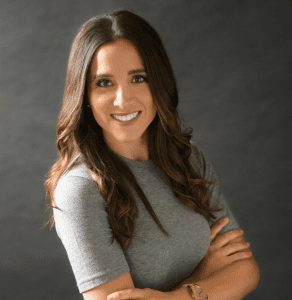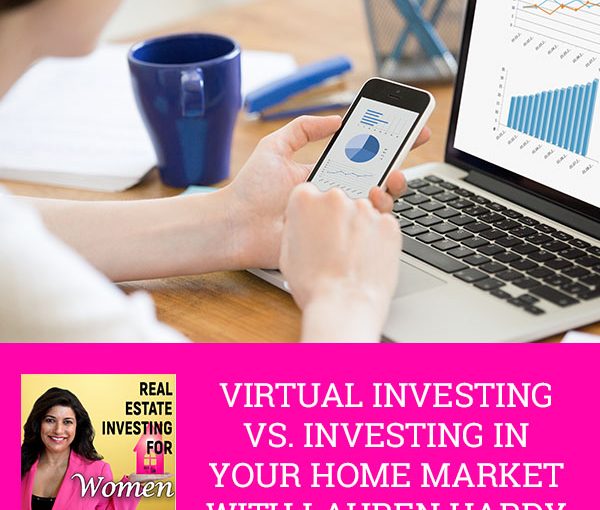Virtual Investing Vs. Investing In Your Home Market With Lauren Hardy – Real Estate For Women

Everyone dreams of having time with their family while achieving financial freedom and it’s something that virtual investing can make possible. As a single mom, Lauren Hardy doesn’t want to have a corporate job either. Instead, she wants to control her time and freedom while still providing for her kids. Having her career evolved in many different ways, she dives deep into how you could earn income in real estate investing by closing deals at home. In this episode, she joins Moneeka Sawyer to discuss flipping houses, virtual investing, and investing in your home market. What do you base your decisions on regarding which markets to enter into? Listen to Lauren Hardy as she shares a lot of valuable insights on business growth and practices that would help you reach success!
—
Watch the episode here
Listen to the podcast here
Virtual Investing Vs. Investing In Your Home Market With Lauren Hardy – Real Estate For Women
Real Estate Investing For Women
I am so excited to welcome to the show, Lauren Hardy. Lauren is a real estate investor with a people-first approach to business. Investing in hundreds of properties in her career, Lauren has the unique reputation of being a successful virtual investor, having not lived in many of the states that she’s invested in. Lauren has been able to persevere in extremely competitive markets by constantly following the market changes and being flexible and willing to move market territories when needed. She currently lives in Southern California with her two daughters but invests in properties all over the country.
—
Lauren, welcome to the show.
Thanks for having me.
I’m so delighted. Lauren has been so kind and patient. We’ve been trying to get her scheduled for over a year. I’m so excited. It’s finally happened. Lauren, could you tell us a little bit about your story like the two-minute high-level version of why you are doing what you are doing?
I’m a single mom of two girls. My big why is I did not want a corporate job. I did not want to have to go in and clock in and clock out and have my time controlled by someone else. I learned very early on when my daughter was first born that this whole parenting thing is pretty tough. It is very hard when you have two parents that have corporate jobs. What do you do when your kid is sick? It so happened that I had one of those babies that got sick every 2 or 3 weeks. It seemed like the universe was telling me that one of us needed to have a more flexible career to take care of this child, then fast forward, I had another baby.
Chase lifestyle design and freedom to have an enriched life. Share on XIf you want to go even more, fast forward, I’m now a single mom. I knew early on there was something telling me you need to be able to work from home and have a flexible schedule. I was willing to do anything. I didn’t care what the job was and what the business was. I would do it as long as I could work from home. It so happened that my brother started flipping houses and he was having some success in it. I’ll take you guys back. It was 2012, and he said, “You should look into this because you only have to flip a couple of homes. You’ll make your salary that you’re making now and you can stay home with the kids.” I thought it sounds good. That was my start and that is my why that I’ve always chased time, freedom, lifestyle, design.
I’m obsessed with lifestyle, design, and living a very good enriched life. I don’t necessarily need a rich life and aspire to make tons of money, although that’s great. For me, it was time and freedom. That was my number one why. My career has evolved in many different ways. It started out as house flipping. I got into some ground-up development projects and then I got into wholesaling. Right now, my investment company is more based on volume wholesaling. I wholesale properties outside of my market territory, so not in California. I do it out-of-state and my career has evolved. I coach virtual wholesaling. That’s what I’m known for. That is a high level of what my business is all about.
Lauren, that was unbelievable. You said many magical things. I want to highlight a couple of things for you that Lauren said so eloquently but you may not have caught. First of all, she talked about having an enriched life rather than a rich life. Did you catch that? That is how I live, too. There’s so much of the time people are like, “I got to be rich.” If you’re only got to be rich, there’s no way to know when enough is enough or when your life has reached that place where now you get to relax.
Now you get to reap the benefits and you get to go out there and focus more on what you are going to do out there in the world or what you are going to do from your family rather than chasing the dollar. Something that’s key for us women is we get caught up in this male-competitive like it’s never enough. What’s next? You never want to stop striving to be the best version of yourself, but the best version of you doesn’t necessarily mean the richest you could possibly be.
I love the way that Lauren has talked about, “I don’t need to be super-rich,” but she needs to make sure she can take care of her kids and herself and, obviously, put her kids through college and retire. She’s got this plan. She didn’t talk about it, but we can all make that those assumption, I’m sure. It’s all about the enriched life. It’s not about, “How much money can I make?” The second thing is, normally, when I ask people to give me their high-level story, they start from the very beginning and move to now.
What Lauren did, and I want you to capture this in your heart, is she started with her why because our why is the secret to our life. It’s a secret here business and to your success. Without even thinking about it, she led with that because that’s what drives her and it’s an amazing driver. If we understand our why, we will never stop doing the things that will help us to achieve ours why no matter how bad we feel in the morning, no matter what challenges we come up against, because that’s how business is.

Virtual Investing: Because of market saturation within the Metro, from other investors doing the same types of marketing techniques, they are competing after the same homes.
Nothing in life is a cakewalk. Things happen, but that why is going to be the thing that draws your heart forward and keeps you moving even when they’re in challenges. Lauren, first of all, I want to say thank you so much for that incredibly eloquent story and the way that you led us through so much learning by being who you are.
You’re welcome.
Now, let’s talk about how do you know which markets to enter into. What do you base these decisions on?
I have a lot of experience jumping in and out of markets. The markets change depending on what’s going on in the economy and your particular market. I have been in different types of markets. I live in Southern California. The average house price here is around $850,000, so not cheap. It’s very expensive. I’m in a very high price market where I live. However, this market was amazing during the recession. During the recession, you could get amazing deals on real estate here and it wasn’t that difficult. Anybody who wanted to be a house flipper could be one. Here around 2012, 2011 and before, but things changed.
The real estate market got very hot throughout the country, especially in these high prices, major metros. It became difficult to do this business here in Southern California. Your market could be amazing for the time being then you might have some situation that makes it change and you need to be flexible. I don’t know if you’ve read the Who Moved My Cheese? book, but I like to make that reference if anybody has read the book. My cheese moved around 2016. The real estate market got hot and it became very hard to find a flip project here. I had to find another market or I had to get a full-time job. It was one or the other.
How do you know where a good market is? If you’re asking me, the major metros are pretty tough. A lot of people are crying in the major metro saying, “There are no deals,” but do you know where I hear there are still deals? It’s 30 minutes out from the major metro where people are commuting. Maybe they have jobs in the major metro, but they have to commute. That will change with time, like if there is some distress and if the bubble bursts, who knows what’s going to happen in the future? If the real estate market starts to go down again, the major metros might be hot again or it might be easy to do real estate.
You need to follow market trends and you need to stay relevant and on top of it. One of my favorite ways to stay relevant is networking with people in the market you’re in and asking them, “Are you picking up good deals? Is it getting harder? What’s your marketing cost to get your deals? Has it increased? Have your wholesale fees gone up or down?” Those are good questions to ask. Hopefully, I answered that question. Probably I think I answered a lot of questions in that.
You did. Are you doing wholesale in these markets? Tell me specifically why 30 minutes out of the main metros? Let me clarify why I’m asking that question. What we’ve seen is that there are a lot of people that have moved out of the metros because of the pandemic. They feel like, “I want a bigger home and more space.” I’m noticing that’s happening. I’m also noticing that a lot of them are assuming that they can work at home still and we don’t know how that’s going to change.
In my area, we’re not seeing 30 minutes. Thirty minutes out from the metro is still the same price as San Jose. You might see a $50,000 drop. I’m in the San Jose area. Our median price is $1.2 million, just so you know. Lauren and I are in tough markets but in my market, you don’t see price drops until about an hour out. Is that a loose guideline? Talk to me a little bit more about that.
It’s a very loose guideline. I did not realize you lived in Northern California. I have a lot of Northern California students that come to me and they completely leave the state. It’s insane. It depends on what kind of investing strategy. I know there are buy and hold audiences on this show, probably, or people that are interested in wholesaling and flipping. It depends on your investment strategy but if you are in an area that is very high priced, you might want to consider going completely out-of-state. I have a price point sweet spot that I like right now. Again, all of this stuff changes. This is in 2021, but I’m saying a year from now, who knows?
Anybody who wanted to be a house flipper could be one. Share on XWhat I’ve noticed, in my experience with being in different markets, trying different markets out, being successful in some of them, not as much in others and also having a lot of students and hearing their feedback is, when the average price point is above $200,000, you are dealing with a different type of seller. There are so many places. This is probably hard for you to realize and me at one point because we’re from California worth $200,000, “What? Is there an area of California where there are prices under 200,000?” No, probably not. It would be difficult to find, but there are plenty of areas in the United States where the average house price is under $200,000. What I’ve noticed is when prices get above $200,000, you’re dealing with a different type of seller. There’s less seller distress in the price point of above $200,000.
Sellers are usually savvier. They have more options and don’t get themselves in as much trouble. They don’t have as many problems for us to solve. As real estate investors, we are problem solvers. We’re looking for homes that we can add value. Usually, these houses are deferred in their maintenance. There’s a type of seller that gets themselves in that situation. The first baseline I want to get you started with is looking at price points in the area. Hands down, anybody I’ve spoken with that their average price point is above $200,000. I start hearing cries of, “There are no deals in this area.” If you’re in an area like San Jose, where you’re even 30 minutes out, you’re still talking $800,000. That’s completely different.
I’m saying find an area that’s even further out until you start seeing that price point. Now, we’re talking. Even so, say an area in a major metro like Oklahoma City or Indianapolis, for example. Atlanta, Georgia, is a beautiful example as well. Your average house price point is around $200,000 or lower. They meet that price point but because of market saturation within the metro from other investors doing the same types of marketing techniques, they are competing after the same homes. That’s what I mean by going 30 minutes out of Atlanta. You’ll notice there are a lot less investors willing to go 30 minutes out.
They’re still very hung up on the major metro, so you might have better luck out there for now. If the market cools down and there’s more distressed inventory, think back to 2011 when you could even go probably to San Jose. I know in Orange County, you could go to the Trustee Sales. They are auctioning houses out to whoever will take them. We’ll be back in those major metros because there’s more inventory, but right now, inventory is low in those major metros. You need to start thinking about going outside of them.
The price point that you’re looking for is under $200,000. Is that true?
Yes.
Talk to us a little bit about how you market to these people that you’ve never met and you’re probably never going to meet them.
Direct to seller marketing is my specialty. I’ve never purchased an investment property off the MLS to date, and it’s been many years. I learned direct to seller marketing. That’s all I know. I don’t know how to work with realtors. I started the business out when direct mail was the thing to do. I’ve done direct mail for many years, but I do other stuff. We do cold calling and mass text messaging.
I got into TV ads, and that’s been exciting. I’m doing all direct to seller stuff. I’ve done some online like Google Ad Words and Facebook Ads as well. I wouldn’t say it’s my specialty. I’m not a big fan of that marketing method and I’ve got a bunch of reasons why. I don’t focus on that as much, but I still find that cold calling, mass texting and the TV Ads are working well and direct mail as well.
Do you need boots on the ground, people and how do you find them?
You definitely need people in your corner in the market that you’re in. I have my team, I call them a runner, a very crucial person that you can hire there. It’s not that hard to find and basically, that means an errand-runner. I made up that term. What that person does is they run all the errands that I would have run if I was at that local market. If you need to buy a property and take photos, that’s your runner’s job. I pay them around $20 an hour. I find that type of person on Craigslist. It’s a super easy position to fill.

Virtual Investing: Alignment is important. Take a week to find that perfect partner. Maybe it’s not just one person, or three. Sometimes a JV partner may be good at one niche.
It’s usually someone who’s looking to make some extra money on the side. They present themselves well and they’re professional-looking. You want to make sure because this person is representing your company. You want to make sure you interview. You can do a Zoom interview and make sure that they present themselves well. That’s a very important boots-on-ground person that you need. What I recommend is when you start in a virtual market, to team up with another investor that is doing what you’re trying to do and do a few deals with them at first.
Maybe do your first 5 to 10 deals with that partner. I called this partner a JV partner, which means Joint Venture partner. I’m big on teaming up, partnering, and collaborating at first because you’re going to cut your learning curve. Every market has nuances that you don’t understand until you’re in it for six months. A good way to cut those six months in half or more is having that JV partner who can explain those nuances to you right then and there, and you learn them quicker. If it was just you figuring out those nuances on your own, it could take quite a long time, so I do recommend JV partnering as well as. It’s like a crucial boot on the ground you need to have.
How do you find a JV partner in that market?
I love Facebook and REIAs, the Real Estate Investment Associations that are local in the area. You can ask, “I’m looking to partner on a deal who is actively wholesaling in this area.” Tag a friend or somebody that you know. I’ve gotten all of my JVs mainly from Facebook and then word of mouth. You maybe talk to someone and ask them like, “Do you know anyone? Do you know a wholesaler who’s active?” It’s wholesaling specifically, getting on other wholesaler’s buyer’s lists, and see who’s producing a lot of deals every month, then get on the phone and talk to them about being a partner.
I’m sure you interview them to make sure that you’re aligned and they’ve got a good reputation and all of that stuff. Is that true?
One hundred percent. Alignment is important because you can get a bad JV partner for sure. Ask if they know what they’re doing, but they don’t. That’s a common one. They aren’t doing that many deals in the area, but they are excited so they say they are. I always say do Goldilocks and the three bears like, “Do you know if this one is too hot, too cold, or if this one is right.” I tell my students personally, “Take a week to find that. Maybe it’s not one person or there are three people that you want to work with and try out.”
Sometimes, a JV partner may be good at one niche like they can sell one type of house and have these types of buyers, but they don’t have others. They don’t have a variety of buyers on their list. That’s why you might want to have maybe 2 or 3 that you work with and spend time trying to find that 2 or 3. Call twenty-plus of them, have a lot of conversations and you’ll have that feeling of, “This one is just right.” After you talked to enough of them, you’ll know who stood out to you.
Do you go into several different markets? For instance, if you’re wholesaling, do you go into one market and hang out there? How many deals in that market before you move to another market? How does that work for you?
Bouncing in and out of markets is a very hard thing to pull off. Every market has nuances. I always say it takes six months to figure a market out. I don’t bounce around. Where I have moved is when a market got too competitive. If my marketing cost to get one deal was starting to get way too high, I might move markets but knowing that I’m going to stay in that market for a while. I have had moments where I’ve tried markets out and it didn’t feel like the ones I’ve been successful in, I’ve moved out of them maybe after a month.
I’ve done that before, but it’s not something I recommend. I don’t recommend jumping in and out and trying to be in five markets at once. Every market is its own baby. You need to think of it as a baby, nourish it and spend time with it. If you’re going to open up a new market, plan on not making any money for six months and focusing on it. You don’t want to take away from your market that’s producing well. You want to make sure that if you are in one market and you’re doing well but maybe you want to expand, you want to make sure that the market that you’re doing well in is still churning and burning and you’ve got someone managing it so you can take your focus onto building out the new one.
Try to test different markets in your real estate business. Share on XI love that and I love this focus. Again, this are little gems by Lauren. She says there’s one market that’s performing, but she knows it’s time to move, so she’s got someone managing one and she’s focusing on the other one. This is true on so many levels in life. If you got a W-2 job and you want to become a real estate investor, you don’t quit your W-2 job and become an investor because there’s lag time. There’s a learning curve and lead times. It’s not just this strategy is every strategy. Many of what Lauren is saying is so valuable in so many different strategies. You want to make sure you’re not freaked out and making bad decisions because you don’t have cashflow coming in.
Some people are like, “Burn your bridges and you’ll be highly motivated,” and you’ll be freaked out and you could make bad decisions. It’s better if you can do a transition, have a transition time and plan it rationally so that you’ve got some time to create success. That’s cool. Thank you, Lauren. Lauren and I are going to talk to you about the four key performance indicators that you should be tracking that she tracks.
However, we’re out of time on this portion of the show. We are going to bump that to EXTRA. She says that she can do a nice deep dive on what are the key performance indicators that she tracks and you should be tracking. As we’re going to close out this show, there’s a couple of questions I have for you. First, are you ready for our three rapid-fire questions?
I am.
Lauren, tell us one super tip on getting started in real estate investing.
I think I already dropped the super tip. I’m sorry if I spoiled it, but I do recommend aligning yourself with a partner. Go into this saying, “I am going to partner with somebody for my first 5 to 10 deals.” That’s a big mistake I made. If I were to put some time, I wish that I didn’t have such an ego and I would have partnered for my first two years. When I first got started, it was 2012, it was an amazing time to be a house flipper but I didn’t know it because I didn’t have experience and hindsight. I didn’t know much about real estate in general. Had I known what I know now, I wish I would have partnered with someone that was doing a very high volume of flips in my area. I would have 50/50 gone in with them and done way more flips and made way more money because I would’ve had them with me.
Part of it is the courage aspect. I don’t want to generalize, but I do feel what I’ve noticed with myself being a female and even some of my female students is we have a fear. We have a little bit more sometimes of a heightened fear response. Flipping is scary. Real estate investing can be scary. It can be intimidating. If I would have had a partner that was maybe ten years ahead of me and would have been like trailblazing with me, I would have been like, “They’re my safety blanket. They know what they’re doing and they say it’s a good deal. Let’s do it.” I didn’t have that person. It was all me and I was doing a lot less than I was capable of, honestly. That’s my big tip. Get a partner.
I’ve got a partner, too, but one thing that I want to say is mentorship is key. Getting a partner is unbelievably important. However, do your due diligence on each of those projects. In your case, maybe someone would have brought you a lot of good stuff. They had ten years of experience, but that’s still no guarantee of success in the next project on the one that you’re going to be involved in.
You do your due diligence on the project, you find out why they think it’s a good deal, and you can take a look at it and see why you think it’s a good deal or not because that tightens your learning curve even more. Now you’re fully engaged, you have this trust factor, got some person to bounce some stuff off of, and somebody mentoring you, you’re also learning how to do your due diligence, which was helpful, too. I love that tip. What is one strategy for being successful in real estate investing?
Something that I’ve done and I do well is make friends. Having friends in my back pocket in every niche of real estate investing has been so rewarding. It’s been nice. Anytime I’m struggling with an aspect of my business, I know whom to call. They say your network is your net worth. I thought that quote was cheesy, but it is a little bit true. I literally can pick up my phone if there’s ever a problem. I have somebody in my phone that I can call and figure it out, so make friends.
What is one daily practice that you would say contributes to your personal success, Lauren?
I discovered this little hack and it’s made a big difference in my life. I don’t do it every day, but I do it as often as I can think to do it. I would say this is more of a mindfulness strategy. I like to write down a list of what’s going well and what is not working. What’s working? What’s not working? I’ll then write on a piece of paper. I get my yellow pad out. I never leave it anywhere, by the way. This yellow pad is here next to me. First, I want to express gratitude and I want to say what’s going well because I think it’s important to acknowledge what you’ve accomplished that’s going well like, “Good job. You solve that problem.” It was a problem. You solved it. Now, it’s going well.

Virtual Investing: Write down a list of what’s going well and what is not working. It’s important to acknowledge what you’ve accomplished.
Sometimes, this has a lot to do with lifestyle design. A lot of it is my kids. Maybe their schools are not working out or are working out if we’re talking going well. I love their school. Their days there are great. Their campus has been amazing. The routine is going well. You want to list everything that is going well in your life. It’s important to express some gratitude, but then I turn it over and I write, “What needs work?”
I brain-dump the stuff that I’m feeling the weight. If I’m feeling something is broken, what are the things that are broken that we can fix? Every time you look at that list, you might start noticing correlations. Sometimes you’ve got five things, but they’re all related to your commuting too much. You’re driving too much in the car. Maybe you’re feeling tired. You have a lot of brain fog. You’re having a hard time staying focused or your diet. You start realizing like, “How can I fix this? What tools do I need to fix these problems?”
From there, I start writing out possible solutions. Sometimes those possible solutions are things that I can immediately do now. Sometimes, it’s letting go of a bad employee that’s draining everybody on the team or the possible solution is hiring a coach of some kind. You need mentorship and coaching. Maybe it’s getting a new doctor, whatever it is. This is a pretty big step, but it made such a big difference. Because of COVID, my kids’ school got distance learning.
I couldn’t do it anymore. I couldn’t handle the responsibilities of being a business owner and being a home mom. One day, all my problems are all my things that were going wrong were related to that. I picked up the phone that day and called every private school that I knew was open and got them into private school the next week and stress lifted. I love that daily practice. I think everybody would benefit from doing it.
I have a million things I want to say but this is your spot, so I’m not going to say anything, but that was amazing. I’ve enjoyed talking to Lauren. I hope you’ve enjoyed, too. We talked a little bit about what’s going on and there have been some transitions in her company. Lauren, thank you so much for joining us for this portion of this show. This has been amazing.
Thank you so much for having me. It’s nice to be on a show that’s also female-focused. It’s hard because I feel like we are in a very male-dominated industry, so it’s always fun to collaborate with other working women. It’s exciting, honestly. I love what you’re doing.
My pleasure, Lauren. Ladies, Lauren has got more for us. We’re going to be talking about the four KPIs that she focuses on in her markets and that you should too when you’re looking at markets outside of your home area. Stay tuned for that. That is going to be on EXTRA. If you are not subscribed to EXTRA but would like to be, go to RealEstateInvestingForWomenEXTRA.com. The first seven days are free so check it out.
Of course, if you love it, and I hope you will, you will stick with us. For those of you that are leaving us now, thank you so much for joining Lauren and me for this portion of the show. Has it been wonderful? I look forward to seeing you next time. Until then, remember, goals without action are dreams so get out there, take action and create the life your heart deeply desires. I’ll see you soon. Bye.
Important Links
About Lauren Hardy
 Lauren Hardy is a real estate investor with a “People First” approach to business. Investing in hundreds of properties in her career, including developing spec houses in Nashville Tennessee, Lauren has the unique reputation of being a successful “virtual investor” having not lived in many of the states she’s invested in.
Lauren Hardy is a real estate investor with a “People First” approach to business. Investing in hundreds of properties in her career, including developing spec houses in Nashville Tennessee, Lauren has the unique reputation of being a successful “virtual investor” having not lived in many of the states she’s invested in.
Lauren is a graduate of Cal State Fullerton’s Mihaylo College of Business and Finance with over 10 years experience in Real Estate. She began her real estate career in 2007 working in the corporate sector for companies such at Sperry Van Ness, Subway Restaurants and The Irvine Company.
After her first daughter was born her values changed along with her perspective of how companies can improve in giving their employees more work life balance. After becoming a mother she dreamed of creating a business that would give her personal and professional satisfaction, but with the flexibility to make sure she wouldn’t miss the important moments of her family life. She has only ever worked in real estate so launching her own real estate investment company made sense.
Lauren has developed a reputation in the industry for persevering in extremely competitive markets by constantly following the market changes and being flexible and willing to move market territories when needed. Lauren currently lives with her two daughters in Southern California and travels to her market territories several times a year.
Love the show? Subscribe, rate, review, and share!
______________________________________
To listen to the EXTRA portion of this show go to RealEstateInvestingForWomenExtra.com
To see this program in video:
Search on Roku for Real Estate Investing 4 Women or go to this link: https://blissfulinvestor.com/biroku
On YouTube go to Real Estate Investing for Women
Moneeka Sawyer is often described as one of the most blissful people you will ever meet. She has been investing in Real Estate for over 20 years, so has been through all the different cycles of the market. Still, she has turned $10,000 into over $5,000,000, working only 5-10 hours per MONTH with very little stress.
While building her multi-million dollar business, she has traveled to over 55 countries, dances every single day, supports causes that are important to her, and spends lots of time with her husband of over 20 years.
She is the international best-selling author of the multiple award-winning books “Choose Bliss: The Power and Practice of Joy and Contentment” and “Real Estate Investing for Women: Expert Conversations to Increase Wealth and Happiness the Blissful Way.”
Moneeka has been featured on stages including Carnegie Hall and Nasdaq, radio, podcasts such as Achieve Your Goals with Hal Elrod, and TV stations including ABC, CBS, FOX, and the CW, impacting over 150 million people.

